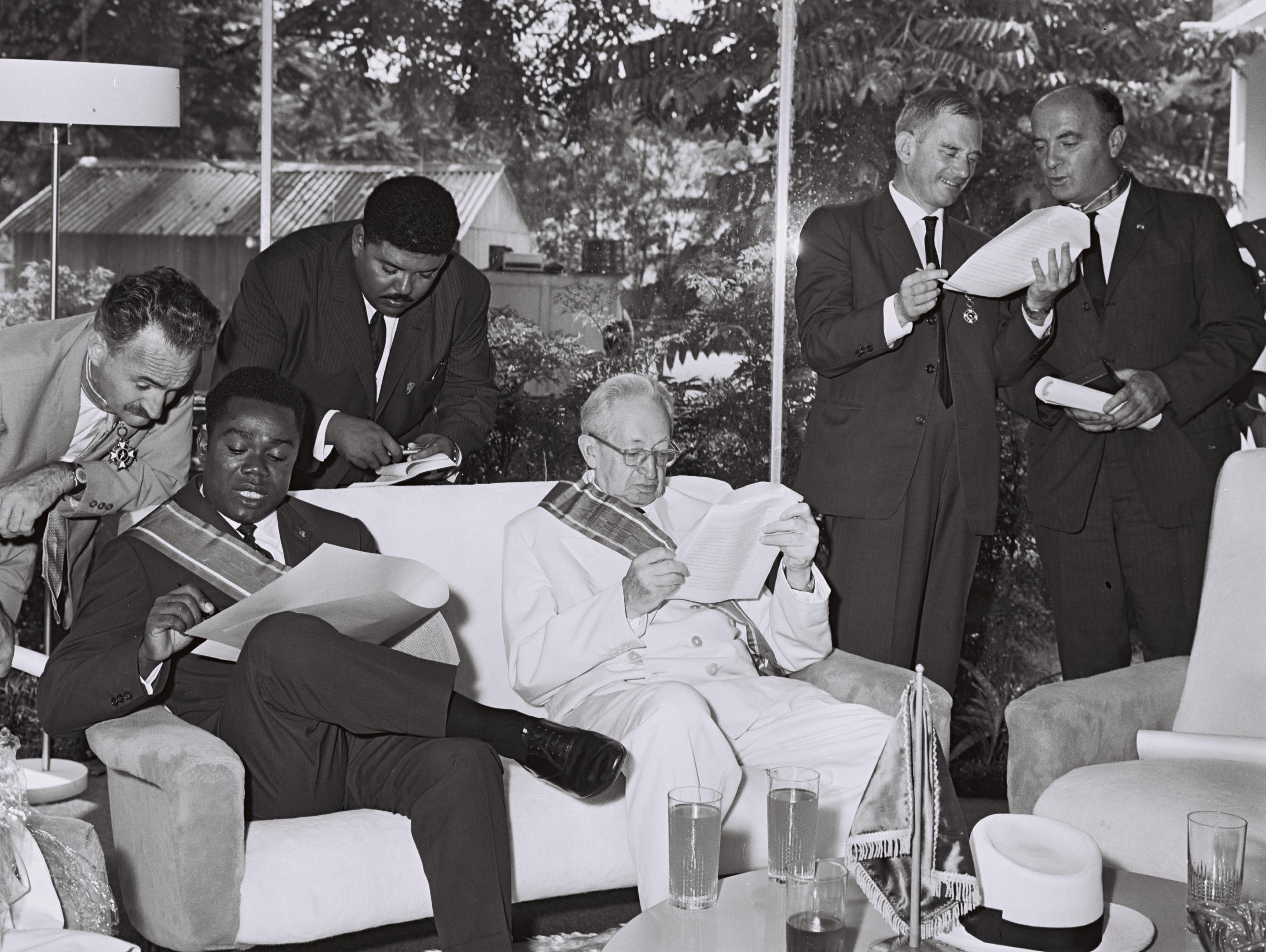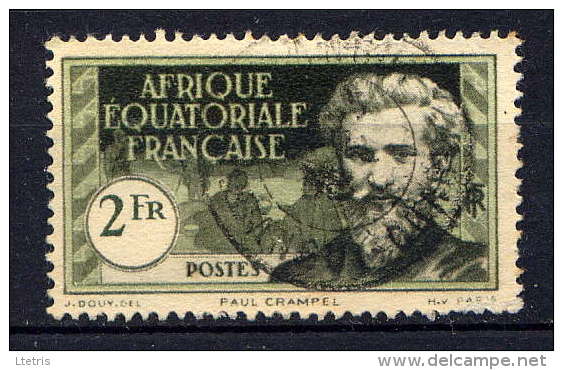|
Movement For The Social Evolution Of Black Africa
The Movement for the Social Evolution of Black Africa (french: Mouvement pour l'évolution sociale de l'Afrique noire; MESAN) was a political party in the Central African Republic. In its original form, it was a nationalist quasi-religious party that sought to affirm black humanity and advocated for the independence of Ubangi-Shari, then a French colonial territory. History The party, which was initially intended to work as a political movement, was founded by Barthélemy Boganda in Bangui, Ubangi-Shari (later known as the Central African Republic) on 28 September 1949, to connect "all the Blacks of the world" and "to promote the political, economic and social evolution of black Africa, to break down the barriers of tribalism and racism, to replace the degrading notion of colonial subordination with the more human ones of fraternity and cooperation." The statutes of the movement were written in April 1950, and the group's branches were set up in Ubangui, Fort Lamy and Brazza ... [...More Info...] [...Related Items...] OR: [Wikipedia] [Google] [Baidu] |
Barthélemy Boganda
Barthélemy Boganda (c. 1910 – 29 March 1959) was a Central African politician and independence activist. Boganda was active prior to his country's independence, during the period when the area, part of French Equatorial Africa, was administered by France under the name of Oubangui-Chari. He served as the first Premier of the Central African Republic as an autonomous territory. Boganda was born into a family of farmers, and was adopted and educated by Roman Catholic missionaries after the deaths of his parents. In 1938, he was ordained as a Roman Catholic priest. During World War II, Boganda served in a number of missions and afterwards was persuaded by the Bishop of Bangui to enter politics. In 1946, he became the first Oubanguian elected to the National Assembly of France, where he spoke out against racism and the abuses of the colonial regime. He then returned to Oubangui-Chari to form a political organisation, culminating in the 1949 foundation of the Movement for the S ... [...More Info...] [...Related Items...] OR: [Wikipedia] [Google] [Baidu] |
Ubangui
The Ubangi River (), also spelled Oubangui, is the largest right-bank tributary of the Congo River in the region of Central Africa. It begins at the confluence of the Mbomou (mean annual discharge 1,350 m3/s) and Uele Rivers (mean annual discharge 1,550 m3/s) and flows west, forming the border between Central African Republic (CAR) and Democratic Republic of the Congo. Subsequently, the Ubangi bends to the southwest and passes through Bangui, the capital of the CAR, after which it flows southforming the border between Democratic Republic of the Congo and Republic of the Congo. The Ubangi finally joins the Congo River at Liranga. The Ubangi's length is about . Its total length with the Uele, its longest tributary, is . The Ubangi's drainage basin is about Mean annual discharge at mouth 5,936 m3/s Its discharge at Bangui ranges from about to , with an average flow of about . It is believed that the Ubangi's upper reaches originally flowed into the Chari River and Lake Chad before ... [...More Info...] [...Related Items...] OR: [Wikipedia] [Google] [Baidu] |
Independence
Independence is a condition of a person, nation, country, or state in which residents and population, or some portion thereof, exercise self-government, and usually sovereignty, over its territory. The opposite of independence is the status of a dependent territory. The commemoration of the independence day of a country or nation celebrates when a country is free from all forms of foreign colonialism; free to build a country or nation without any interference from other nations. Definition of independence Whether the attainment of independence is different from revolution has long been contested, and has often been debated over the question of violence as legitimate means to achieving sovereignty. In general, revolutions aim only to redistribute power with or without an element of emancipation,such as in democratization ''within'' a state, which as such may remain unaltered. For example, the Mexican Revolution (1910) chiefly refers to a multi-factional conflict that e ... [...More Info...] [...Related Items...] OR: [Wikipedia] [Google] [Baidu] |
1959 Central African Republic Parliamentary Election
Parliamentary elections were held in the Central African Republic on 5 and 29 April 1959. The result was a victory for the Movement for the Social Evolution of Black Africa (MESAN), which won all 48 contested seats on election day. Two seats were left vacant, and the vote for one seat won by MESAN was declared void. In a re-run, all three seats were won by MESAN, giving it all 50 seats in the National Assembly. EISA Voter turnout was 56.71%. Results References {{Central African Republic electionsCentral Africa
Central Africa is a subreg ...
[...More Info...] [...Related Items...] OR: [Wikipedia] [Google] [Baidu] |
Abel Goumba
Abel Nguéndé Goumba (; 18 September 1926 – 11 May 2009) was a Central African political figure. During the late 1950s, he headed the government in the period prior to independence from France, and following independence he was an unsuccessful candidate for President of the Central African Republic four times (1981, 1993, 1999, and 2005). Goumba, who was President of the Patriotic Front for Progress (FPP) political party, served under President François Bozizé as Prime Minister from March 2003 to December 2003 and then as Vice President from December 2003 to March 2005. Subsequently, he was appointed to the official post of Ombudsman. Early life He was born in 1926 in Grimari, Ouaka Prefecture in the Oubangi-Chari French colony, which is now the Central African Republic. He was a qualified medical doctor and member of the medical faculty in Bangui. Entry into politics While the country was still a French colony, Goumba was Vice-President of the Government Council fro ... [...More Info...] [...Related Items...] OR: [Wikipedia] [Google] [Baidu] |
David Dacko
David Dacko (; 1927 – 21 November 2003) was a Central African politician who served as the first president of the Central African Republic from 14 August 1960 to 1 January 1966, and 3rd President from 21 September 1979 to 1 September 1981. After his second removal from power in a ''coup d'état'' led by General André Kolingba, he pursued an active career as an opposition politician and presidential candidate with many loyal supporters; Dacko was an important political figure in the country for over 50 years. Early life and education Dacko was born in the village of Bouchia, near Mbaïki in the Lobaye region, which was then a part of the French Equatorial African territory of Ubangi-Shari to Joseph Iniabodé and Marie Okolania. His parents belonged to the same ethnic group. A M'Baka (Ngbaka), he was a distant cousin of future rival Jean-Bédel Bokassa. Soon after Dacko's birth, his family moved to Boda, where his father worked in a store belonging to a European coffee planter ... [...More Info...] [...Related Items...] OR: [Wikipedia] [Google] [Baidu] |
Étienne N'Gounio
Étienne, a French analog of Stephen or Steven, is a masculine given name. An archaic variant of the name, prevalent up to the mid-17th century, is Estienne. Étienne, Etienne, Ettiene or Ettienne may refer to: People Scientists and inventors *Étienne Bézout (1730–1783), French mathematician *Étienne Louis Geoffroy (1725–1810), French entomologist and pharmacist *Étienne Laspeyres (1834–1913), German professor of economics and statistics *Étienne Lenoir (1822–1900), Belgian engineer who invented the first internal combustion engine to be produced in numbers *Étienne Lenoir (instrument maker) (1744–1832), French scientific instrument maker and inventor of the repeating circle surveying instrument * Étienne Mulsant (1797–1880), French entomologist and ornithologist *Étienne Pascal (1588–1651), French lawyer, scientist and mathematician best known as the father of Blaise Pascal *Étienne Geoffroy Saint-Hilaire (1772–1844), French naturalist * Étienne Pierre ... [...More Info...] [...Related Items...] OR: [Wikipedia] [Google] [Baidu] |
Westport, Connecticut
Westport is a town in Fairfield County, Connecticut, United States, along the Long Island Sound within Connecticut's Gold Coast. It is northeast of New York City. The town had a population of 27,141 according to the 2020 U.S. Census. History The earliest known inhabitants of the Westport area as identified through archaeological finds date back 7,500 years. Records from the first white settlers report the Pequot Indians living in the area which they called ''Machamux'' translated by the colonialists as ''beautiful land''. Settlement by colonialists dates back to the five ''Bankside Farmers''; whose families grew and prospered into a community that continued expanding. The settlers arrived in 1693, having followed cattle to the isolated area. The community had its own ecclesiastical society, supported by independent civil and religious elements, enabling it to be independent from the Town of Fairfield. As the settlement expanded its name changed: it was briefly known as "Banksid ... [...More Info...] [...Related Items...] OR: [Wikipedia] [Google] [Baidu] |
Greenwood Press
Greenwood Publishing Group, Inc. (GPG), also known as ABC-Clio/Greenwood (stylized ABC-CLIO/Greenwood), is an educational and academic publisher (middle school through university level) which is today part of ABC-Clio. Established in 1967 as Greenwood Press, Inc. and based in Westport, Connecticut, GPG publishes reference works under its Greenwood Press imprint, and scholarly, professional, and general interest books under its related imprint, Praeger Publishers (). Also part of GPG is Libraries Unlimited, which publishes professional works for librarians and teachers. History 1967–1999 The company was founded as Greenwood Press, Inc. in 1967 by Harold Mason, a librarian and antiquarian bookseller, and Harold Schwartz who had a background in trade publishing. Based in Greenwood, New York, the company initially focused on reprinting out-of-print works, particularly titles listed in the American Library Association's first edition of ''Books for College Libraries'' (1967), unde ... [...More Info...] [...Related Items...] OR: [Wikipedia] [Google] [Baidu] |
1957 Ubangi-Shari Territorial Assembly Election
Territorial Assembly elections were held in Ubangi-Shari on 31 March 1957. The first and second college system for giving separate seats to Europeans and Africans was scrapped, and all 50 seats elected by universal suffrage. Juan Fandos-Rius The result was a victory for the Movement for the Social Evolution of Black Africa
The Movement for the Social Evolution of Black Africa (french: Mouvement pour l'évolution sociale de l'Afrique noire; MESAN) was a political party in the Central African Republic. In its original form, it was a nationalist quasi-religious party ...
[...More Info...] [...Related Items...] OR: [Wikipedia] [Google] [Baidu] |
French Equatorial Africa
French Equatorial Africa (french: link=no, Afrique-Équatoriale française), or the AEF, was the federation of French colonial possessions in Equatorial Africa, extending northwards from the Congo River into the Sahel, and comprising what are today the countries of Chad, the Central African Republic, the Republic of the Congo, and Gabon. History Established in 1910, the Federation contained four (later five) colonial possessions: French Gabon, French Congo, Ubangi-Shari and French Chad. The Governor-General was based in Brazzaville with deputies in each territory. In 1911, France ceded parts of the territory to German Kamerun as a result of the Agadir Crisis. The territory was returned after Germany's defeat in World War I, while most of Cameroon proper became a French League of Nations mandate not integrated into the AEF. French Equatorial Africa, especially the region of Ubangi-Shari had a similar concession system as the Congo Free State and similar atrocities were also c ... [...More Info...] [...Related Items...] OR: [Wikipedia] [Google] [Baidu] |

%2C_by_John_Trumbull.jpg)


